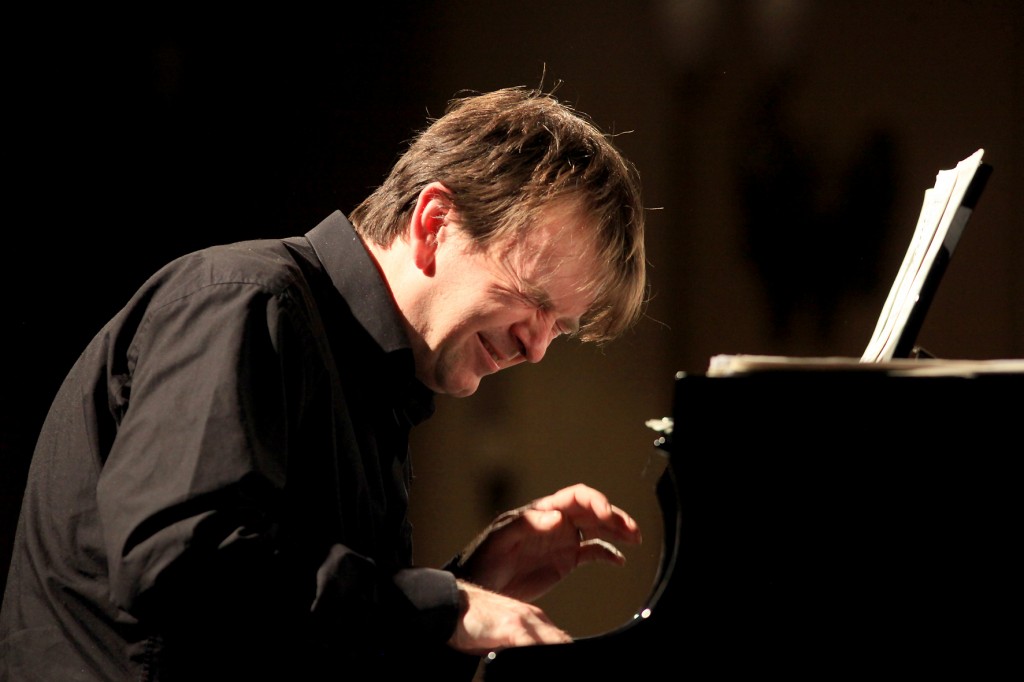Frederic Rzewski's Songs of insurrection is specifically composed for the Belgian pianist Daan Vandewalle, one of the world's leading figures in contemporary solo piano music, specializing in twentieth-century concert music
Rzewski remains one of today's composers to have most enriched the repertoire of this instrument, which was already relatively monumental given its great popularity in the nineteenth century). His pieces have easily transcended the world of contemporary music, without compromising its demanding aesthetic aspirations, nor falling into the easy way. The composer draws on many influences, including avant-garde music, classical repertoire, minimalism and jazz.
Freedom is the key word inseparable from his social commitment as well as from his music, which often springs from improvisation. Even if Rzewski has often engaged in an ingenious relationship between contemporary music and revolutionary popular songs (in the tradition of Cardew and Eisler), these Songs of insurrection approach another way of constructing music with a political significance, without being explicitly stated as such. It is a question of subtle transformations of protest songs organized among themselves, where the pianist must also improvise cadenzas, in the pure tradition of the nineteenth century, more or less neglected in the contemporary repertoire.
7 songs are the basis of Songs of insurrection :
Die Moorsoldaten (The Song of the Deportees)
Probably the best-known anti-fascist song of the 20th century, the Song of the Deportees or Song of the Marshes was written by prisoners in the Börgermoor concentration camp in 1932. It is said that from its first appearance, it became so popular that Nazi guards (who considered themselves "swamp soldiers") joined in the prisoners' song.
Katyusha
Written in 1941 by Matvei Blanter, with lyrics by Mikhail Isakovsky, during the German invasion of the USSR, this song was quickly re-appropriated and adapted by resistance movements in several countries, such as Greece and Italy (Fischia Il Vento).
Ain't going to Let Nobody Turn Me Around
A traditional gospel song from the 19th century, this song became one of the anthems of the civil rights movement in the United States in the 1960s. It has been sung by Joan Baez, Barbara Smith and The Roots, among others.
Foggy Dew
A ballad that has become standard in Irish culture, Foggy Dew emerged from the Easter Rising, sometimes referred to as the Bloody Easter in 1916, which led to Irish independence.
Grândola, Vila Morena
Portuguese song composed by Zeca Afonso in 1974. It tells the story of the brotherhood of the inhabitants of Grândola, a town located in the Alentejo. Considered to exalt communist ideas, it was initially censored by the regime of Antonio de Oliveira Salazar. It is associated with the Carnation Revolution and the restoration of democracy in Portugal.
Los Cuatros Generales
A famous revolutionary song, whose model was Los Cuatros Muleros (an old Andalusian love song revived by Federico Garcia Lorca), Los Cuatros Generales refers to four putschist generals of the Spanish Civil War.
Oh Bird, Oh Bird, Oh Roller
Song born during the Korean peasant rebellion of Donghak in 1894. Sung throughout Korea, it is said to have been sung for the first time at the performance of Jeon.
Co-accueil
Friche la Belle de Mai
Co-order
Concertgebouw Brugge, GMEM, Music on Main in Vancouver and TivoliVredenburg in Utrecht
Dann Vandewalle
Pianist, composer
Daan Vandewalle is an internationally renowned pianist who interprets the music of the twentieth and twenty-first centuries.
Its repertoire consists of hundreds of pieces, most of them complete, by well-known composers of the twentieth century such as Charles Ives, Olivier Messiaen, but also numerous creations that result from intense collaborations with composers of today.
He has performed in a wide range of venues, from small clubs in the underground experimental music scene, to established venues such as the Prague Spring Festival, Lincoln Center in New York or the Théâtre du Châtelet in Paris.
His long-standing collaboration with American composer Alvin Curran resulted in a 6-hour marathon series of performances of the piano cycle "Inner Cities" (Harmonia Mundi cd box, 1996) and his first recording of Charles Ives' sonata "Concord" (1996), was praised by the American press.
He has premiered dozens of new plays by Frederic Rzewski, Clarence Barlowe, Maria De Alvear, Fred Frith and Gordon Mumma.
He is one of the only pianists in the world who plays Sorabji's entire "Opus Clavicembalisticum" and Clarence Barlowe's extremely complex "Cogluotobusisletmesi". His projects include Ligeti's "Piano Concerto" at Carnegie Hall in New York and the Prague Spring Festival.
In addition to his work as a soloist, he forms a duo with legendary Australian pianist Geoffrey Douglas Madge; duets with cellist Arne Deforce and singer Salome Kammer.
Since 2001 he has been teaching piano at the Ghent Conservatory, Ghent College.
Frederic Rzewski
Pianist, composer
American and Belgian resident Frederic Rzewski was born on April 13, 1938 in Westfield, Massachusetts.
He began his musical studies with Charles Mackey, then at Harvard and Princeton Universities where he studied with Gregory Tucker, Randall Thompson, Claudio Spies, Walter Piston, and Milton Babbitt.
In 1966, he was one of the founders of Musica Elettronica Viva di Roma, a group dedicated to improvisation on electronic instruments.
A pianist and composer with politically engaged works, he has received grants and awards from the Fromm, Ford, Woodrow Wilson, Fulbright and National Endowment for the Arts. His work, "Song and Dance" was chosen to represent the United States at the International Rostrum of Composers/Unesco in 1979.
Rzewski has taught at the Art Institute of Chicago, and has been professor of composition at the Royal Conservatory of Music in Liège since 1977.
— Source: Ircam-Centre Pompidou, 2000
Friche la Belle de Mai (Petit Plateau)
41 Jobin Street13003
Marseille
DURATION
1h05
RATES
Unique €6
Pass €5
Dann Vandewalle
pianist
WORKS OF
Frederic Rzewski
Songs of insurrection






